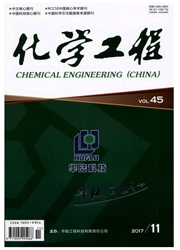

 中文摘要:
中文摘要:
运用吉布斯自由能最小化方法对生物质粗燃气自热重整过程进行了热力学分析,研究了重整反应过程中的温度,O2/CH4摩尔比及焦油摩尔分数等因素对平衡产物组成的影响规律。研究结果表明:低温有利于CO歧化与加氢反应,而高温促进了CH4和CO2的转化,提高合成气H2+CO摩尔分数,降低H2/CO摩尔比。O2/CH4摩尔比的增加有利于生物质燃气从部分氧化反应向完全氧化反应转变,促进了CH4的重整反应而抑制了CO1的转化;O1/CH4摩尔比的增加降低了合成气H2+CO摩尔分数,降低了H2/CO摩尔比,在重整后的生物质粗燃气中,n(H2)/n(CO)≈1。积碳量随温度升高和O2/CH4摩尔比的增加逐渐减少,随着焦油(C10H8)物质的量的增加而增加。焦油物质的量增加提高了合成气中H2与CO摩尔分数,是重整反应的重要原料。优化的生物质燃气自热重整反应条件为温度1023K,O2/CH4摩尔比0.7,焦油摩尔分数〈1%。
 英文摘要:
英文摘要:
The thermodynamic equilibrium analysis on the autothermal reforming of biomass syngas was performed by using the minimization of Gibbs free energy. The effects of operation parameters such as temperature, O2/CH4 mole ratio and tar mole fraction on the reforming performances were studied. The results show that both the CO hydrogenation and Boudouard reaction are promoted, whereas methane reforming is restrained at lower temperature. Increasing temperature facilitates the conversion of methane and CO2, the increase of mole fraction of syngas formed and the decrease of H2/CO mole ratio. The increase of O2//CH4 mole ratio promotes the methane reforming and restrains the CO2 conversion, and it increases the amount of syngas formed and decreases the HE/CO ratio. After reforming, the n( H2) :n(CO) is about 1. The amount of carbon deposit presents a decreasing trend with increasing temperature and O2/CH4 ratio. As an important raw fuel, tar can promote the total amount of syngas whereas resulting in carbon formation. The optimal autothermal reforming conditions were designed as 1 023 K, mole ratio of O2/CH4 = 0.7 and tar mole fraction 〈 1% .
 同期刊论文项目
同期刊论文项目
 同项目期刊论文
同项目期刊论文
 Effect of H2/CO ratio on microstructure and catalytic performance of precipitated iron-based catalys
Effect of H2/CO ratio on microstructure and catalytic performance of precipitated iron-based catalys Auto-thermal reforming of biomass raw fuel gas to syngas in a novel reformer: promotion of hot-elect
Auto-thermal reforming of biomass raw fuel gas to syngas in a novel reformer: promotion of hot-elect Effect of iron promoter on structure and performance of CuMnZnO catalyst for higher alcohols synthes
Effect of iron promoter on structure and performance of CuMnZnO catalyst for higher alcohols synthes Transformation of carbonaceous species and its influence on catalytic performance for iron-based Fis
Transformation of carbonaceous species and its influence on catalytic performance for iron-based Fis Preliminary investigation on hydrogen-rich gas production by co-steam-reforming of biomass and crude
Preliminary investigation on hydrogen-rich gas production by co-steam-reforming of biomass and crude Different Methods for Evaluating Pinewood Sawdust Pyrolysis Kinetics by Thermogravimetry Mass Spectr
Different Methods for Evaluating Pinewood Sawdust Pyrolysis Kinetics by Thermogravimetry Mass Spectr Synthesis of Fe3O4-nanocatalysts with different morphologies and its promotion on shifting C5 + hydr
Synthesis of Fe3O4-nanocatalysts with different morphologies and its promotion on shifting C5 + hydr Influence of manganese promoter on co-precipitated Fe-Cu based catalysts for higher alcohols synthes
Influence of manganese promoter on co-precipitated Fe-Cu based catalysts for higher alcohols synthes Ultrasonic-assisted production of biodiesel from transesterification of palm oil over ostrich eggshe
Ultrasonic-assisted production of biodiesel from transesterification of palm oil over ostrich eggshe Preparation and characterization of carbonaceous adsorbents from sewage sludge using a pilot-scale m
Preparation and characterization of carbonaceous adsorbents from sewage sludge using a pilot-scale m Study of thermal decomposition and kinetics of biomass/Swill-cooked dirty oil blends during co-pyrol
Study of thermal decomposition and kinetics of biomass/Swill-cooked dirty oil blends during co-pyrol Production of light olefins from biosyngas by two-stage catalytic conversion process via dimethyl et
Production of light olefins from biosyngas by two-stage catalytic conversion process via dimethyl et Decentralized Heating in a Rural Village using Biomass Gasification and Anaerobic Digestion: Economi
Decentralized Heating in a Rural Village using Biomass Gasification and Anaerobic Digestion: Economi Analysis of product distribution and characteristics in hydrothermal liquefaction of barley straw in
Analysis of product distribution and characteristics in hydrothermal liquefaction of barley straw in Molecular Dynamics Simulations of Interaction between the Mixture of Glycerol and 1,6-hexanediol and
Molecular Dynamics Simulations of Interaction between the Mixture of Glycerol and 1,6-hexanediol and Hydrogen from biomass degradation production by aqueous-phase reforming : An overview on the catalys
Hydrogen from biomass degradation production by aqueous-phase reforming : An overview on the catalys Influence of alkali catalyst on product yield and properties via hydrothermal liquefaction of barley
Influence of alkali catalyst on product yield and properties via hydrothermal liquefaction of barley Chuangzhi Wu,Influence of manganese promoter on co-precipitated Fe-Cu based catalysts for higher alc
Chuangzhi Wu,Influence of manganese promoter on co-precipitated Fe-Cu based catalysts for higher alc 期刊信息
期刊信息
